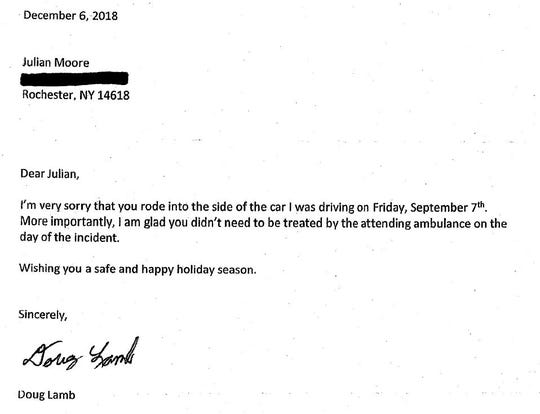Protecting Vulnerable Road Users: A Vicious Cycle
Ten-year-old, Julian Moore was riding his bicycle in a suburb in Rochester, NY on Sept. 7, 2018, when 66-year-old Doug Lamb hit him with his Range Rover.

Figure 1: Julian Moore and his mother, Jenny Moore, walk near the spot where Julian was hit while bicycling. (Photo: Max Schulte/Rochester Democrat and Chronicle).
Lamb stopped the car after his collision with Moore, but did not give his information to Julian, the paramedics, or Julian’s mother. By the time the police arrived, Lamb had departed the scene. It took two weeks for the police to track Lamb down and charge him with the misdemeanor crime of leaving the scene of an accident causing personal injury. Pittsford Town Judge John Bernacki had decided to adjourn the case in contemplation of dismissal, meaning Lamb’s record would be wiped clean, on the condition that Lamb write an apology to the boy.
His apology letter read:
This act of “contrition” drew sweeping public scorn in January after the boy’s mother, Jenny Moore, posted a copy of the letter on her Facebook Page and the backstory subsequently made headlines around the country. In response, prosecutors moved to re-open the case and proceed to trial for failing to meet the apology requirement of his plea deal.
Prosecutor Daniel Strollo said his office pursued the case to the extent that it did because Lamb neglected to meet the condition to which he agreed to resolve the matter. “Mr. Lamb was given one simple instruction: to send a letter of apology,” Strollo said. “He didn’t do that. When you don’t follow through on the terms of a commitment for a plea or a disposition of a case, our office is not going to just ignore it.”
Lamb plead guilty on Dec. 6 in Pittsford Town Court to leaving the scene of an accident causing property damage—a mere traffic infraction. In exchange, Lamb was ordered to pay a $200 fine, perform eight hours of community service.
Julian’s story garnered national attention for his crash. Lamb was protected by a 5,000-pound vehicle of steel. Julian was protected by a plastic helmet. If it seems ludicrous the legal system could enable Lamb to walk away with a small fine and apology, it may be time to even the playing field and shift legislative protections toward vulnerable road users such as Julian.
Vulnerable Road Users
All over the country, thousands of similar crashes are occurring in the shadows, without the benefit of a national audience holding drivers accountable. The National Highway Traffic Safety Administration data shows 857 cyclists were killed in crashes with vehicles the U.S. in 2018. The same study found Florida leading the country with 161 of those fatalities, finding bicycle deaths for those 20 and older have tripled since 1975.
However, Florida legislators are prepared to step up and do something about the mounting problem, formally adopting “Vision Zero Florida” with a strategic goal of zero traffic fatalities and severe injuries for all users. Part of this vision includes advocacy for a proposed bill, H.B. 455 – Traffic Offenses, in the Florida Legislature which provides criminal penalties for persons committing moving violations causing serious bodily injury or death to a vulnerable road user including: a fine, period of house arrest, mandatory driver education, revocation of driver license. One of the largest shifts however, is the establishment and definition of “vulnerable road user.”
The League of American Bicyclists, a national bicycle advocacy organization, defines a Vulnerable Road User (“VRU”) as “anyone who is on or alongside a roadway without the protective hard covering of a metal automobile. The term includes bicycle riders, pedestrians, motorcyclists, people in wheelchairs, police, first responders, roadway workers and other users like a person on a skateboard or scooter. It is meant to include people who are especially at risk of serious bodily harm if hit by a car, or truck.”
VRU laws operate on the principal of general deterrence – by providing an increased penalty for certain road behaviors that lead to the serious injury or death of certain road users people will be deterred from doing those behaviors around those users.
In 2007, Oregon became the first Legislature to pass, HB 3314, creating an enhanced penalty for careless driving if it contributes to serious physical injury or death to a “vulnerable user of a public way.” Currently, only nine 9 states have laws that define a vulnerable user or VRU and provide particular penalties for actions towards those vulnerable road users or when violations of traffic law lead to the serious injury or death of a VRU – Connecticut, Delaware, Florida, Hawaii, Maine, Oregon, Utah, Vermont, and Washington. In Texas, approximately 28 cities have passed their own VRU laws in the absence of a statewide version.
To advance this legislative effort, the League of American Bicyclists, proposes a model VRU statute for state legislatures. The model language: Section 1) defines VRU protected persons; Section 2) defines when the law is applicable and who can be charged with a violation of the law; Section 3) requires a person charged according to this law to attend a hearing; and Section 4) provides the punishments that are to be given to a person convicted of a violation of this law.
Road Ahead
Without enhanced protection for VRUs through increased penalties, it is common for a driver who kills or seriously injures a VRU to just be given a ticket for careless driving, as illustrated in a 2013 report by the Center for Investigative Reporting finding that in 238 pedestrian fatalities 60% of motorists found to be at fault or suspected of a crime faced no criminal charges.
As the closing lines of Prosecutor Strollo’s motion on behalf of Julian Moore states, “[t]he people are ready for trial.” Echoing a crystalizing national awareness that calls for increased protections to vulnerable road users, the people are ready for legislative change—and states legislatures should consider adopting a version of the VRU model law to meet this demand.
 Alexandra Trobe anticipates graduating from Boston University School of Law in May 2021.
Alexandra Trobe anticipates graduating from Boston University School of Law in May 2021.



